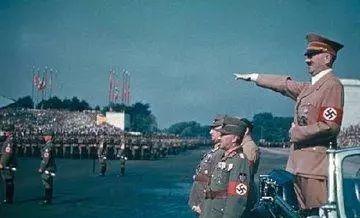World War II was the largest and most tragic war in human history.
Although 77 years have passed since World War II, World War II is still a hot spot for military fans.
There is an interesting question, if someone wears Hitler's soul and corrects the strategic mistakes made by Hitler, is it possible to change history?
To answer this question, we must first analyze what strategic mistakes Hitler made.

First, Hitler suppressed the study of the atomic bomb.
a, Germany is keen on "quick-acting" weapons.
b. Hitler vigorously promoted anti-Semitism, and at least half of the scientists left Germany to become enemies of Nazi Germany, the most important of which was Einstein.
c. Scientists such as Heisenberg secretly misled Hitler to be seduced by scientists who opposed the Nazis, such as Heisenberg.
In June 1942, at a meeting evaluating the prospects of the atomic bomb research program, Heisenberg told the military: "Germany simply did not have the economic power to build an atomic bomb, which disappointed them." ”
If Hitler had possessed the atomic bomb in World War II, the world would have suffered an even greater catastrophe.
Second, Hitler's strategy toward Britain was wobbly.
Hitler believed that Britain had vast colonies and that complete victory over Britain was impossible, and that Hitler had an inexplicable fondness for Britain.
Reflected in the tactical execution, Hitler always wanted to make peace with Britain, so there was always room for manoeuvre.
The most serious consequence was that in the Battle of Dunkirk, Hitler did not heed Guderian's advice to immediately annihilate the besieged British troops, and wasted 7 days, allowing the British army to successfully rescue more than 300,000 veterans. Become the backbone of the British army.
Third, in the Battle of Britain, the strategy of eliminating the main force of the British Air Force was not adhered to, and instead carried out large-scale bombing of the city.
When Germany began the Battle of Britain, the Germans had 3 air groups and 2669 aircraft, half of which were fighters and bombers, while the British had only 700 fighters and 500 bombers, and Germany had a 2:1 advantage.
The Luftwaffe initially aimed to eliminate the main force of the British Air Force, but later changed its strategic objectives.
From September 7, 1940 to September 14, 1940, the German army carried out a large-scale air raid on London day and night, and the British Air Force gained a respite and quickly restored its combat effectiveness.
If the Germans had been working to eliminate the effective forces of the British Air Force and not given the British Air Force a chance to breathe, it would have most likely won the Battle of Britain.
After winning the Battle of Britain, under the cover of the Air Force, it was possible for Germany to land in Britain and end the dilemma of two-front operations.
Fourth, without making peace with britain or occupying LinkedIn, the Barbarossa Plan was launched to attack the Soviet Union.
Fifth, with Moscow close at hand, Hitler did not take advantage of the situation and occupy Moscow, but divided his troops from north to south, transferred the armored group to the south of the Soviet Union, and lost the best and only opportunity to capture Moscow.
The occupation of Moscow would have caused Stalin to migrate to Siberia and would have dealt an incomparably heavy blow to the Soviet Union.
Sixth, ally with Japan.
In World War II, Germany unified Europe except Britain and the Soviet Union, and if it did not ally with Japan, the time for the United States to join the European war would be greatly delayed, the United States would not participate in the war, and although Germany could not win against the Anglo-Soviet alliance, there was still a chance of decent peace.
The alliance with Japan accelerated the time for the United States to enter the European war, and Japan did not have much containment of the United States, and the Heavyweight Boxer of the United States joined the battle, and Germany's defeat was inevitable.
Seventh, allied with Italy.
Italy was Germany's pig teammate in World War II, and Germany's efforts to help Italy put its forces into the Balkans severely weakened Germany's strategic power against the Soviet Union.
If Hitler had avoided these seven strategic mistakes, could Hitler have changed the historical outcome of World War II?
Still not, because the real factor that determines the victory or defeat of a war is comprehensive national strength.
For example, industrial capacity, geographical location, population and quality of the population.
These were the key factors that shaped the situation in World War II.
The real history is that the times make heroes, not heroes make the times.
The real truth of history is that historical figures seem to lead the trend, but they are actually wrapped up in the trend and move forward.